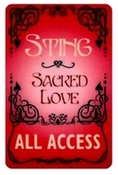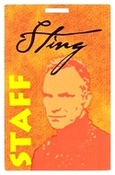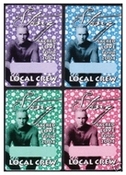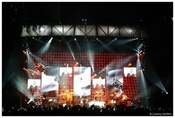
Sting sings tepid funk: Fans adoring. Songwritng talent died with Police...
Sting last night delivered dull, melody-free dross like This War and a seemingly interminable Sacred Songs that battled it out with brief moments of excitement like Englishman in New York.
To disappoint his adoring fans at this point in his career, Sting would have to strangle a puppy on stage. And even then, the rich, cool, charismatic Gordon Sumner, Commander of the British Empire, might somehow get away with it.
Ask any of the 3,000 thoroughly pumped-up devotees who attended the singer's sold-out show at Salle Wilfrid-Pelletier of Place des Arts last night, and they'll probably tell you it was a spiritual experience. These are, in fact, the people who delivered a standing ovation after the first song, a tepid jazz-lite version of the Police classic 'Walking On the Moon'.
But if you've always suspected Sting's post-Police career has been primarily a celebration of his utter fabulousness - and that his songwriting talent more or less died with his original group - last night's show would not have changed your mind.
The problem became alarmingly clear immediately after that initial standing O, as Sting delivered four clunkers from his most recent album, the dreadful Sacred Songs.
Smart, imaginative visuals on giant screens gussied up the presentation of each song.
But there was no masking the fact that 'Send Your Love', 'Inside', 'Forget About the Future' and 'Dead Man's Rope' are typically turgid examples of the kind of tuneless funk and featherweight pop that passes for songcraft in the Sting catalogue these days.
As if to underline the diminishing-returns factor himself, a hard-rocking version of another Police classic followed - and 'Synchronicity II', released in 1983, was, indeed, the high point of the evening. It was a momento of Sting at the top of his game, rocking hard and spitting out solid hooks.
Things stayed almost on track as backup singer Joy Rose joined Sting for a genuinely fiery duet of 'Whenever I Say Your Name', with Rose actually trumping Mary J. Blige's performance on the studio version. The chemistry between the two was sweet, Rose's pipes were astounding on the extended ending and the audience cheered lustily. But the dirty little secret was out again: no song.
And so it went: dull, melody-free dross like 'This War' and a seemingly-interminable 'Sacred Songs' battled it out with brief moments of excitement like 'Englishman In New York' and an extended, but faithful 'Roxanne'. While the difference was dramatic, the audience made little distinction between the old and the new, delivering a steady stream of screams and cheers and jumping on their feet at regular intervals.
Sting's seven-piece backup band delivering solid, if unspectacular, accompaniment - perfect shading, in fact, for a singer who might have stopped being an artist to settle in for a lifetime of adult-contemporary product, suitable for car commercials.
He's not the first. Look what complacency and underachieving have done for Rod Stewart, the Rolling Stones and Elton John, among others. And, please, don't use the word ''maturing.'' If maturing means losing the muse, it's time to blow the dust off that copy of 'Reggatta De Blanc'.
(c) Montreal Gazette by Bernard Perusse
Sting as he is...
An intimate show yesterday at Salle Wilfrid-Pelletier at Place des Arts. Intimate, yes, you read that right. We could have been at the Bell Centre, but it was at the PdA that Sting chose to honour 3,000 die-hard fans (2,952 to be exact) with a single, sold-out show last night. This was no doubt to attract those who weren't there for the summer tour with Annie Lennox, at the Bell Centre itself. In the meantime, we had it all to ourselves.
Say what you will about this venue; when you want something to happen, you can, as proof: it happened yesterday. It must be said that the audience wanted it very, very much. Chris Botti, the very Miles Davisian trumpeter who provided the opening act, even received a standing ovation, which is saying something. He didn't clash at all with what was to follow, in fact, he even bore a certain physical resemblance (only younger) to the one everyone was expecting.
The handsome Sting himself brought a half-hour of trumpet and a short intermission afterward. At the back of the stage, three rectangular screens arranged side by side, that's all. Quite British understatement. And Sting, slim and youthful in his black shirt with white collar and cuffs, embraced a double bass to sing 'Walking on the Moon'. A clever introduction if ever there was one: first of all, the girls all want to be his double bass, and then how many people were there yesterday for the handsome Englishman's latest album, 'Sacred Love'? In any case, the whole room stood up as one, and we had to wait until 'Synchronicity II' to see it again, five songs later, all taken from his latest album. No bad songs, but, well, how can I put it? It leaves us a little unsatisfied. There's both too much noise and not enough soul, and we wonder what happened to the man from "Fragile," let's say. Perhaps the surprise effect of the first hits has worn off? We can believe it. It seems like he's repeating himself, trying to redo what worked well before. Obviously, the die-hard fans are delighted because they've rediscovered their true Sting. What's more, he had the elegance to address the crowd only in French (oh, that accent!), which was sure to win over the sceptics, if there were any.
A few new songs, like the very gospel-like "Whenever I Say Your Name," which Sting sings as a duet with his backing vocalist Joy Rose, or the very sad "Dead Man's Rope," still give us some serious goosebumps. Others fall flat, like 'This War', denouncing the war in Iraq, heavily supported by projections halfway between Soviet realism and pop art. But quickly, quickly, the skilful strategist followed up with 'Fragile', and that was it: he had the audience in his pocket. No one was going to sit down again until the end of the second encore.
(c) La Presse by Fabienne Couturier
March 22, 2004
SET LIST
- Walking On The Moon
- Send Your Love
- Inside
- Forget About The Future
- Dead Man's Rope
- Synchronicity II
- Whenever I Say Your Name
- I Was Brought To My Senses
- This War
- Fragile
- Fields Of Gold
- Stolen Car (Take Me Dancing)
- Sacred Love
- Englishman In New York
- Roxanne
- The Bed's Too Big Without You
- Never Coming Home
- Desert Rose
- If I Ever Lose My Faith In You
- Every Breath You Take
- A Thousand Years








